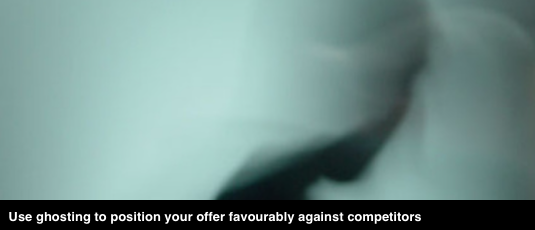This post continues our series on taboo subjects—areas proposal teams typically avoid in responses—and suggest ways to handle them. Earlier posts covered service issues, risk and pricing. This post recommends ways to address your competition.
Mentioning competitors by name really is taboo. It risks provoking a negative reaction from evaluators—and legal action from those named. Instead use “ghosting,” the practice of skilfully explaining how your understanding, decisions (components, pricing, etc.), and team are superior to those of an invisible but ever-present “other.”
Ways to use ghosting
Ghost to offset competitor strengths, exploit competitor weaknesses, reinforce your relative strengths and defend your perceived weaknesses. For example:
- Ghost your closest competitor’s weaknesses (e.g. safety issues, weak customer support, poor delivery performance), by playing up your relative strengths in that area.
- Ghost a competitor’s richer feature set by explaining its drawbacks (expensive, failure-prone, not required for performance, costly to repair).
- Ghost your relative size. If your company is smaller, ghost the size argument by stressing your responsiveness, ability to provide a single point of contact and track record of successful projects. If larger, ghost with your service footprint, depth of technical resources and bench strength.
- Ghost anticipated price differences. Ghost a competitor’s lower price by citing features of your offer that reduce total cost of ownership (longer life, low maintenance design) and costs attributable to satisfying the prospect’s list of must-have features. If you expect to have the price advantage, avoid being out-ghosted by showing your solution is as robust and fully-featured as your competitors’.
Use trade-offs to add credibility to ghosting claims
Trade-offs show you have carefully considered and dismissed alternatives, thereby demonstrating understanding and boosting credibility. Use trade-offs to reinforce your strengths on hot-button issues. See below for two examples.
- Desire for on-time completion: “We typically use one paving contractor on projects of this size, but have included two on our proposed team. This will require more coordination on our part, but increases deadline certainty, even in the case of unexpected delays.”
- Need for high reliability: “We considered the AR470-B, which complies with the RFP requirements, but selected the AR580-B for its superior reliability due to the high cost of downtime for your operations.“
Effective ghosting takes competitive intel
You need to know your closest competitors’ strengths and weaknesses to ghost effectively. Most ghosting arguments also show responsiveness, but the impact is magnified when you target areas of relative superiority. If you are not investing in competitive intelligence, you risk being ghosted without defence.
Avoid condescension and overuse when ghosting
Some evaluators may find ghosting preachy. Be sure to use restraint and ask reviewers to watch for instances that could cause offence.
Ghost sparingly. Even if well done, excessive ghosting will turn off evaluators. Plan your ghosting opportunities during the proposal strategy phase and deploy them where they’ll have the greatest impact.


